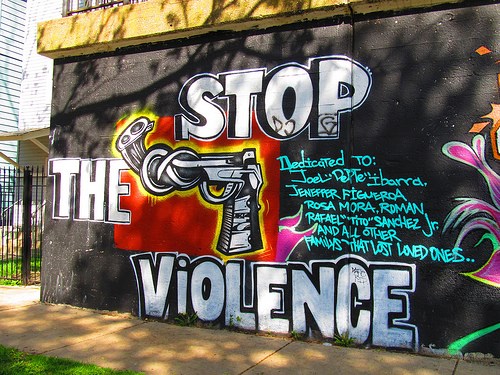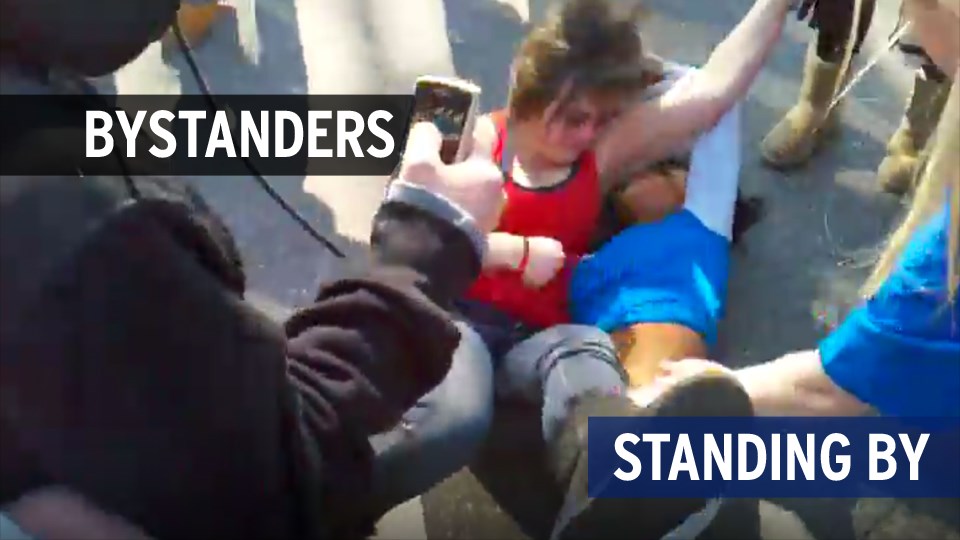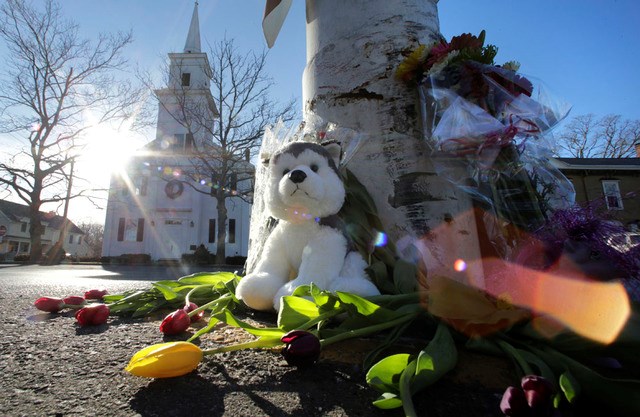
Some of the videos that are being posted online these days are so shocking that I don't really know what to do with them. I'm referring here to videos where one person or a group of people is beating someone up and someone else is filming it, others who are standing around are laughing their socks off or expressing themselves in other ways of being entertained. Some also cheer the aggressors on. Innocent bystanders appear as if lacking any initiative to intervene — probably out of fear or sheer shock.
The latest one that I happen to see was the video of a fight on train station in Philadelphia in which a group of teens are kicking and punching each other and one young man is even falling on the tracks. You see the scared commuters trying to get out of the way of the youth in an attempt to avoid getting hurt. One of the high school students is even kicking another youth, who is laying on the floor, repeatedly in the head. Fortunately no-one got seriously hurt.
A reaction from some of the witnesses makes it clear that many commuters avoid taking the train around 3pm when school gets out. Mainly, because this is not the first time this happened and it appears to be a recurring phenomenon. It is a tragic display of what the world is coming to.
The good thing about sharing these videos with the public is of course that the culprits are sometimes being caught and it gives media attention to these horrific events. But there is also a downside. Apparently it provides the attackers with status. The more online hits, the higher the status rises.
And when they are caught, chances are they will end up in prison. Of course none of them really want to end up in prison. But for some, when they get through and especially when affiliated with gangs, it even further raises their status. So I'm not so sure if posting these videos online is all that good.
But all that aside, what can be done about it? More surveillance, more police, more discipline? Perhaps it helps, but if you are looking for status or peer approval, this might only exacerbate the situation. Those youth are apparently not afraid to use excessive violence, so a camera or a police officer here and there might not do it. What then?
I believe we have to get to the core of the problem and ask ourselves where this aggression stems from. I am making an assumption here, but my gut tells me that the youth participating in these type of activities are often victims of violence themselves or at least are being exposed to violent situations frequently.
The aggressor as victim. Not an unusual statement in psychology but hard to swallow if you are the parent of a kid that has been beaten up and traumatized for life by a school mate. I have experienced bullying when I was a kid of 10 years old and it is affecting me to this day. I'm 43 years old now.
I recall one incidence. Biking home from school, as we do in The Netherlands, I was stopped by some fellow class mates. I used to play the violin for a brief period of time and was carrying the case on my back. If that is not the ideal circumstance for a bully! I don't remember what was said or done exactly, but I ended up being thrown of my bike and laying on the street. One of my best friends was with me and apparently he was totally ok with how the situation unfolded.
The rest of the bike ride home, I was crying and did not want to tell my parents what happened. I kept it to myself. To this day, I have a hard time expressing my opinion because I'm afraid what people might think. In a way writing these columns is therapy for me and I think it helps.
I was not seriously hurt and no permanent physical damage was done. I have also forgiven my attackers as well as my friend, but the mental trauma that follows is sometimes further reaching and it does affect ones future choices. Now, let us turn this around and bring it back to the aggressor as victim.
They are also victims of violence in a way that is affecting their future actions. I'm am not trying to compare my bullying experience to anyone who is being exposed to severe mental or physical abuse, because that is undeniably far more traumatizing. But that is exactly my point.

If a minor incident, as is the case in my situation, is impacting me for life, then how will someone, who is being abused or is witness to violence on a regular basis, be affected? I believe that violence in this case becomes the norm. This means that the only way to tackle this, is to change normative behavior in youth. How do you do that?
I wrote an article for the latest issue of CATALYST Review: "From Transactional to Transformational Policies for NYC Youth." Catalyst is a glossy online and print publication to promote and catalyze creative enterprise. It is created by alumni and faculty of Pratt Institute and focusses on leadership and developing thriving cultures and creative economies.
The article is primarily a commentary on how New York City has run its youth programs and how it plans to address some of the shortcomings in these programs. Through this article I am adding my two cents and provide some seeds of thought on what I think should be included as well. For one, schools are also very transactional in their approach. Get them in, teach them math and literacy and get them out.
It doesn't work, because many of the youth do not have their education as a priority. They are dealing with unstable household situations, school bullying, delinquency or dropping out, issues with the justice system, emotional or physical abuse, despair and hopelessness, substance abuse or lack of trusted support to name a few. Their minds are distracted by more immediate concerns, with little impetus or hope that things will improve.
Resulting behavioral patterns in youth are not addressed in the NYC Department of Education curriculum for public schools. I am not talking about a separate class on behavior or morals, but in my opinion, a more transformational approach is needed as an integral part of the existing curriculum. Math and Literacy classes that tie in with real life situations and that provide the student with a platform to express themselves.
There are many teachers who have this ability and actually apply this in class, but I wonder if there is a way that this can be institutionalized. Instead of just telling them what to learn and do, we need mentoring, coaching, and proper guidance on how to take ownership of their actions, how to get perspective on which hurdles in life are just part of what life is about (to be distinguished from trauma that needs to be addressed with professional help), how to deal with difficult situations, how to interact with others, etc.

Only then can we start to empower youth and take them on an adventure that instills hope, sparks inner passions, and inspires to discover the possibilities that life has to offer. In other words, a transition from a transactional to a transformational approach is required.
Can someone look into this a bit more thoroughly? Thank you!
Yako



